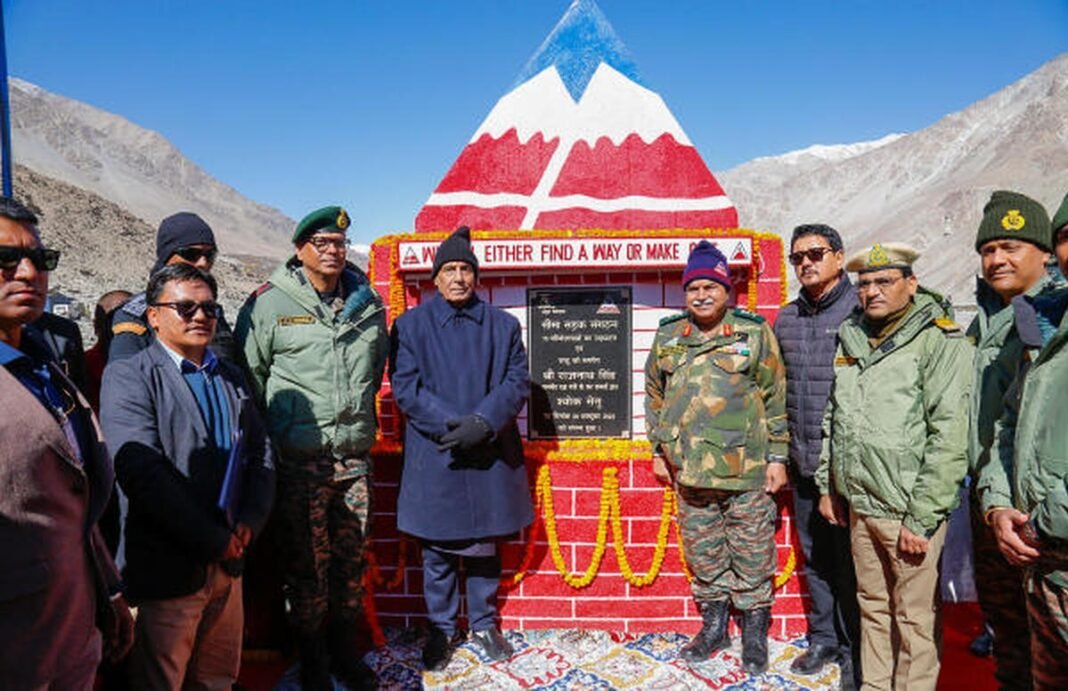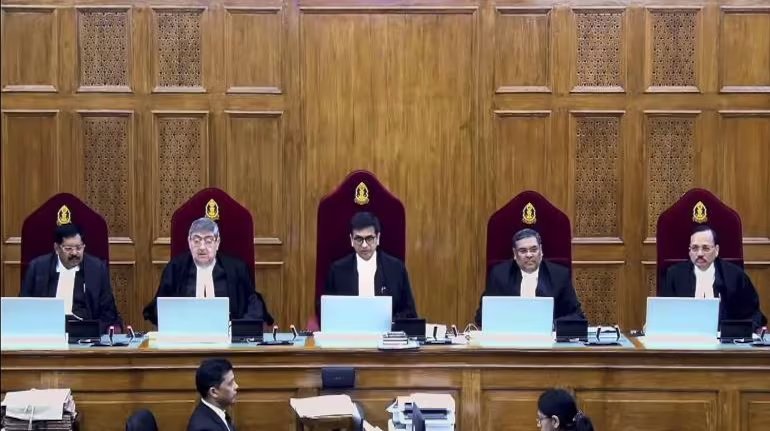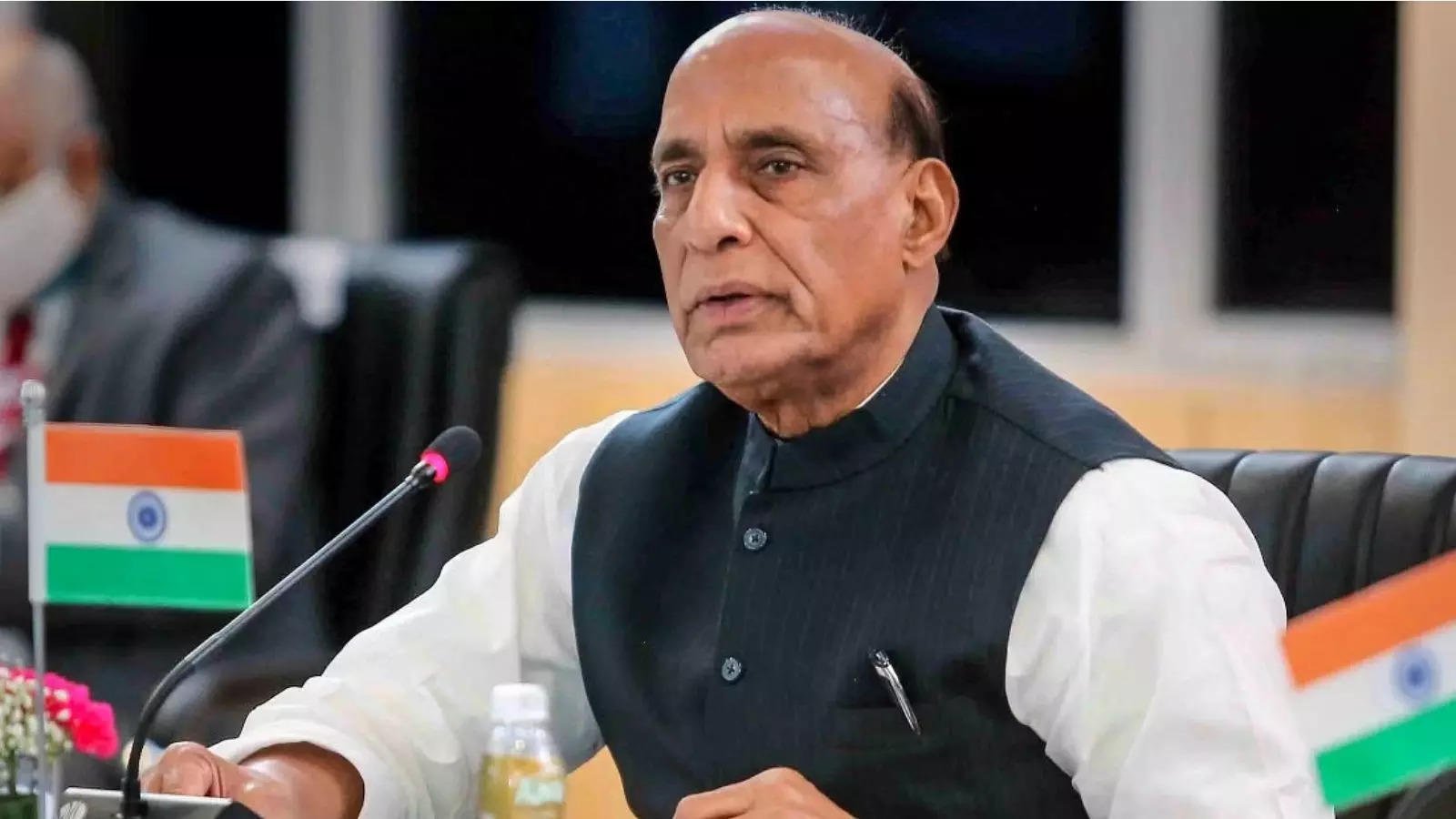‘Lack of infra development in J-K for decades post independence was one of the reasons behind the rise of terrorism in the UT’
NEW DELHI, Oct 28: Lack of infrastructure development in Jammu and Kashmir for decades post Independence was one of the reasons behind the rise of terrorism in the union territory, defence minister Rajnath Singh said on Friday after unveiling 75 new projects including bridges, roads and helipads in border areas.
Singh dedicated the projects costing Rs 2180 crore and spread across border six states and two Union territories at a function held at eastern Ladakh’s strategic Darbuk-Shyok-Daulat Beg Oldi (DS-DBO) road that provides connectivity to the India’s northernmost outpost of Daulat Beg Oldi.
The highlight of the event was the onsite unveiling of 120-metre-long ‘class-70 Shyok Setu’ on the DS-DBO road at an altitude 14,000 feet and virtual inauguration of two helipads, one each in Hanle and Thakung, in eastern Ladakh, the defence ministry said.
The bridge will be of strategic importance as it will facilitate logistics movement of the armed forces. Other projects inaugurated virtually by Singh included two helipads, one each in Hanle and Thakung, in eastern Ladakh, it said.
These helipads will enhance the operational capabilities of the Indian Air Force in the region.
The 75 projects implemented by the Border Roads Organisation (BRO) included 45 bridges, 27 roads, two helipads and one ‘Carbon Neutral Habitat’.
Twenty of the projects are in Jammu and Kashmir, 18 each in Ladakh and Arunachal Pradesh, five in Uttarakhand and 14 in other border states of Sikkim, Himachal Pradesh, Punjab and Rajasthan.
Speaking on the occasion, the defence minister reaffirmed the government’s commitment to ensure the progress of far-flung areas to fulfil the security needs of the country.
“Lack of infrastructure development in Jammu and Kashmir for decades post independence was one of the reasons behind the rise of terrorism in the Union Territory. These internal disturbances resulted in significant decline in tourist footfall that impacted Ladakh also, as well as the entire nation” Singh said at the event.
Singh noted that infrastructure development along with the valour of the armed forces was the main reason that helped India effectively deal with the recent situation in the northern sector, in an apparent reference to Indian military’s response to Chinese PLA’s aggressive behaviour in eastern Ladakh.
He termed the new 75 projects as a testament to that “resolve” and said that these bridges, roads and helipads will facilitate military and civil transport in far-flung areas of the western, northern and north-eastern parts of the country, forming a part of the “development chain”.
“Now, due to the government’s efforts, the region is witnessing a new dawn of peace and progress. Our aim is to continue with the development of all states/Union territories of the country,” Singh added.
He described connectivity with border areas as one of the focus areas of the government for the holistic development of the nation.
Singh said all the remote areas will be connected with the rest of the country soon and “together we will take the nation to newer heights of progress. BRO has a crucial role in achieving this objective”.
The BRO’s first Carbon Neutral Habitat at a height of 19,000 feet for its personnel was also inaugurated at Hanle.
It is BRO’s effort towards contributing to Ladakh’s resolve of becoming the country’s first carbon neutral Union Territory, the ministry said in a statement.
The key features of this complex include accommodation of 57 personnel and thermal comfort during extreme weather. It is expected to enable BRO to operate efficiently during large parts of winters.
The defence minister also laid the foundation stone of Himank Air Despatch Complex being constructed in Chandigarh and a BRO Museum at Leh.
With the onset of winter, once the passes close due to heavy snowfall, BRO extensively utilises air effort for movement of men, machinery and material to far-flung areas.
The existing air dispatch sub-unit located at Chandigarh is being upgraded for providing comfort to transiting troops and to ensure efficient and uninterrupted delivery of essential stores and equipment for execution of works on ground, the ministry said.
It said the BRO will be undertaking the construction of the new complex at Chandigarh by incorporating the latest 3D printing technology and once completed, the building will boast of being the “world’s largest 3D Printed Complex”.
To honour the sacrifices of its personnel and put on record the achievements of BRO, a museum at Leh is being set up, which will be a “source of information and inspiration”, the ministry said.
“This museum building will also be constructed using 3D Printing Technology and on completion, will become the world’s highest 3D Printed Building,” it said. (PTI)







